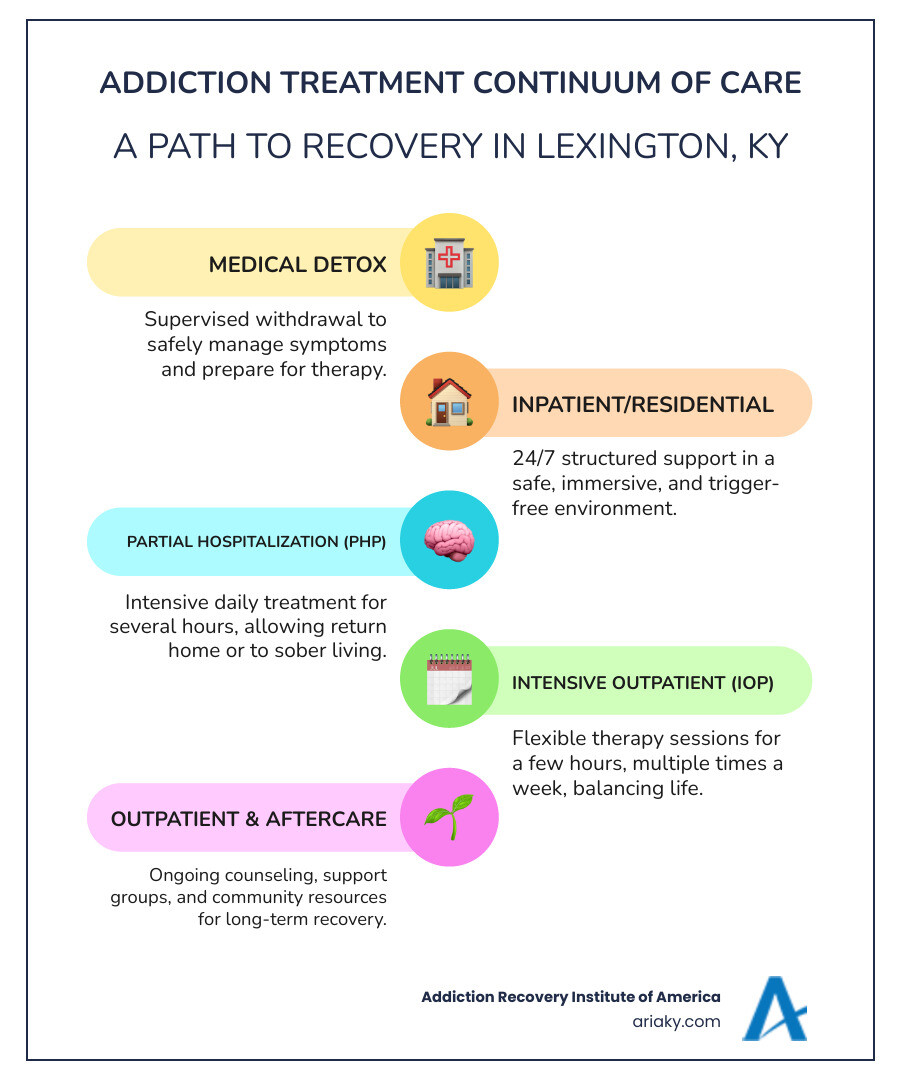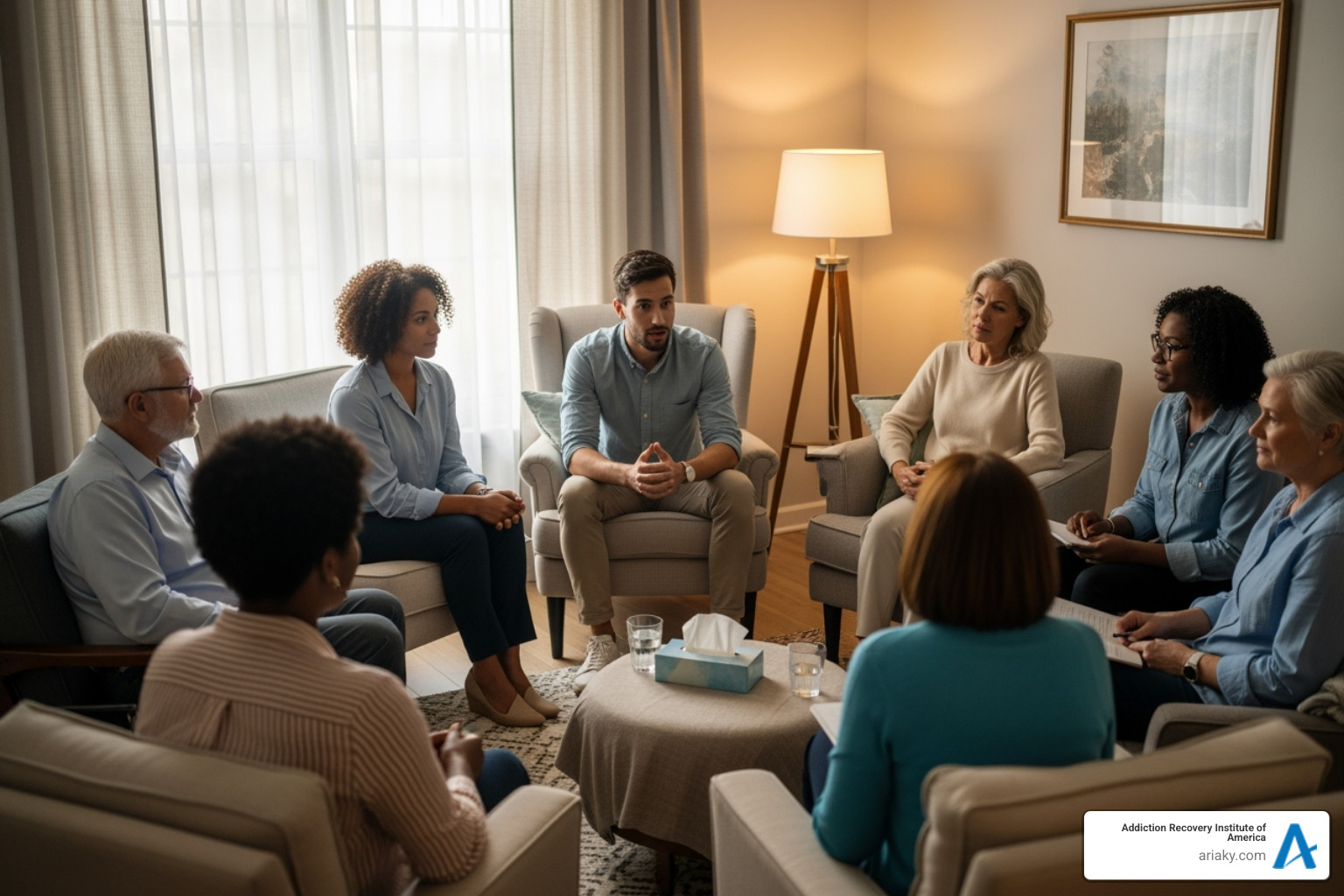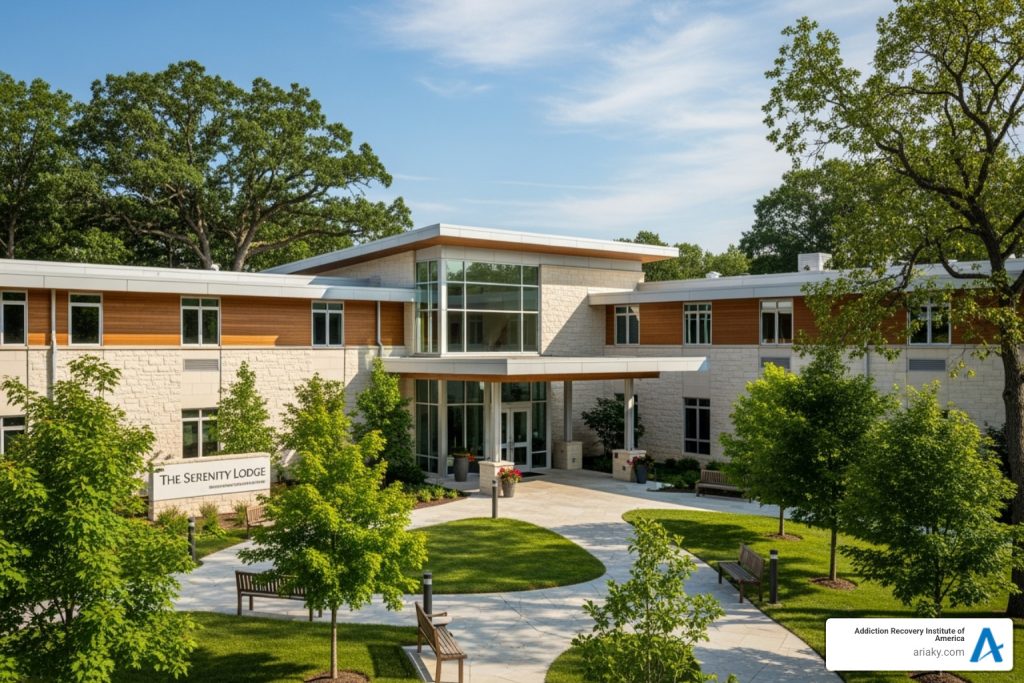Finding Hope and Healing in Lexington
Drug rehab centers in lexington ky offer a full continuum of care to help individuals overcome addiction. If you or a loved one needs help, key treatment options are available:
- Medical Detox: Supervised withdrawal to safely manage symptoms.
- Inpatient/Residential Treatment: 24/7 structured care in a supportive environment.
- Partial Hospitalization Program (PHP): Intensive daily treatment while living at home.
- Intensive Outpatient Program (IOP): Flexible therapy sessions several days per week.
- Outpatient Treatment: Ongoing support for maintaining recovery.
- Specialized Programs: Options for dual diagnosis, medication-assisted treatment (MAT), and more.
Lexington, Kentucky, is known as the Horse Capital, but behind its beauty lies a community facing the challenge of addiction. Kentucky has been hit hard by the opioid crisis, with soaring overdose rates driven by fentanyl and methamphetamine.
But there is hope. More than 40 accredited alcohol and drug rehab centers operate in Lexington, offering evidence-based treatment from medical detox to outpatient care. With state and local support for outreach, education, and expanded treatment, recovery is possible. The first step is finding the right treatment path.

The Scope of Addiction in Lexington and Kentucky
Behind Lexington’s scenic bluegrass hills lies the painful reality of addiction. The numbers tell an important story: drug overdose deaths in Kentucky increased by 48% from 2019 to 2020, placing the state 7th in the nation for overdose death rates.
Fentanyl has become the most common drug involved in fatal overdoses, with methamphetamine ranking second. Fentanyl’s potency means a tiny amount can be deadly, and it is increasingly mixed into other drugs without the user’s knowledge.
In Fayette County, the crisis is personal. In 2020, over 209 people died from overdoses. First responders are on the front lines; in 2017, Lexington’s Division of Fire and Emergency Services responded to 1,567 opioid-related overdose calls, administering 2,515 doses of Narcan to save lives. Heroin use also remains a concern, with an estimated 17,000 Kentuckians over 18 having used it in the last year.
The Opioid Misuse Resource and Needs Assessment for Fayette County, Kentucky provides a deeper look at how addiction has affected our local community.
Comparing Lexington to State and National Averages
Kentucky’s challenges with addiction stand out. Local police seizures of heroin exploded from just 8.5 grams in 2008 to 11,871 grams in 2017, showing how deeply drugs have penetrated the community.
Hospital data reveals another troubling trend. The number of people in Fayette County diagnosed with an opioid use disorder while in the hospital for an unrelated reason rose from 992 in 2012 to 1,579 in 2016. This indicates that many people are living with untreated addiction.
But our community is fighting back. Over 8,000 doses of Naloxone have been distributed in Fayette County in the last five years. Drug rehab centers in Lexington KY have expanded to meet this growing need, with over 40 accredited facilities now operating in the area. State and local governments have increased funding for treatment, mental health services, and prevention. The statistics are sobering, but they highlight why quality addiction treatment is so vital. Every person who enters recovery is a life reclaimed.
Understanding Addiction Treatment Levels of Care
Recovery is different for everyone, so it’s normal to feel confused by the various program types offered by drug rehab centers in Lexington KY. Effective treatment isn’t one-size-fits-all; it follows a Continuum of Care with different levels of support.
Matching the right level of care to your needs is essential for lasting recovery, as emphasized by the Principles of Effective Treatment. Treatment should be personalized, address multiple needs, and be flexible enough to adapt as you progress.
Medical Detox: The First Step
For many, recovery begins with medical detoxification, where you safely stop using substances under professional medical supervision. Withdrawal can be uncomfortable and sometimes dangerous, especially with alcohol. The Alcohol Withdrawal Timeline shows that severe withdrawal can lead to Delirium Tremens (DTs), a life-threatening condition. Detoxing alone is risky. The goal of medical detox is to achieve physical stability safely and comfortably, preparing you for therapy.
Inpatient and Residential Treatment
After detox, inpatient or residential treatment provides 24/7 structured support in a safe, healing environment. You live at the facility, removed from the triggers and stresses of daily life. This immersive setting allows you to focus entirely on recovery. The main difference in Inpatient vs Outpatient care is this residential component and the intensity of support. Inpatient programs offer constant access to medical staff and therapists to help you understand the roots of your addiction.
| Level of Care | Intensity | Housing | Time Commitment (Daily/Weekly) |
|---|---|---|---|
| Inpatient/Residential | Highest intensity, 24/7 medical/clinical care | On-site at facility | Full-time, highly structured, 24/7 supervision |
| Partial Hospitalization Program (PHP) | High intensity, structured treatment for several hours a day | Live at home or in sober living, commute to facility | 5-7 days a week, 4-6+ hours per day |
| Intensive Outpatient Program (IOP) | Moderate intensity, structured therapy sessions | Live at home or in sober living, commute to facility | 3-5 days a week, 3-4 hours per day |
Outpatient Programs: PHP, IOP, and General Outpatient
Outpatient programs allow you to live at home while receiving professional support. They are ideal for transitioning from residential care or for those with a stable home environment.
-
Partial Hospitalization Programs (PHP) are the most intensive outpatient option, with treatment 5-7 days a week for several hours a day. It provides a high level of support while you live at home. Our Lexington PHP Treatment Complete Guide explains this level of care in detail.
-
Intensive Outpatient Programs (IOP) are a step down in intensity, with sessions 3-5 days a week for a few hours each day. This schedule helps you balance recovery with work or family. Our IOP Program Lexington page has more information.
-
General Outpatient offers ongoing support through weekly therapy. It’s suitable for those who have completed more intensive programs or have less severe challenges.
These step-down options are crucial for long-term success, helping you integrate recovery skills into your daily life.
Specialized Programs and Therapies in Lexington
Effective drug rehab centers in Lexington KY recognize that you are an individual with a unique story. They offer specialized programs and evidence-based therapies to create a personalized treatment plan that addresses the root causes of addiction.

Evidence-based therapies like cognitive-behavioral therapy (CBT) and dialectical behavior therapy (DBT) are the foundation of quality treatment. You can learn more about these approaches in our Addiction Therapy Kentucky resource.
Treating Co-Occurring Disorders (Dual Diagnosis)
More than half of individuals with substance use disorders also struggle with mental health conditions like depression, anxiety, or PTSD. This is known as a dual diagnosis. According to the Prevalence of Any Mental Illness (AMI), this overlap is very common. An integrated approach that treats both conditions simultaneously is essential for success. Your clinical team, including therapists and psychiatrists, works together to coordinate care, which may include therapy, medication management, and peer support.
Medication-Assisted Treatment (MAT)
Medication-Assisted Treatment (MAT) is a highly effective, evidence-based approach for treating opioid and alcohol use disorders. It combines FDA-approved medications with counseling and therapy. These medications reduce cravings and manage withdrawal symptoms, giving you the stability to focus on recovery. For those struggling with Opiates, medications like buprenorphine (Suboxone) and naltrexone (Vivitrol) are used. For alcohol use disorder, naltrexone and disulfiram can help maintain sobriety. MAT is not a substitute for therapy; it is a tool that significantly improves outcomes when used as part of a comprehensive treatment plan.
Demographic-Specific and Faith-Informed Programs
Recovery is about healing the whole person. Specialized programs can provide support custom to your life experiences.
- Gender-specific programs for men and women create safe spaces to address issues like trauma, relationships, and societal pressures.
- Programs for young adults, adolescents, and veterans address their unique challenges, from peer pressure and developmental issues to service-related trauma. The Principles of Adolescent Substance Use Disorder Treatment highlights the need for age-specific care.
- Trauma-informed care is a cornerstone of quality treatment, recognizing that many people use substances to cope with past trauma. It ensures treatment promotes healing and safety.
- Faith-informed recovery programs integrate spiritual principles for those who find strength in spirituality, addressing the need for meaning and purpose.
Finding and Paying for Drug Rehab Centers in Lexington KY
Taking the first step toward recovery is a brave decision. We know finding the right drug rehab centers in Lexington KY can feel overwhelming, but help is available.

Online locators like FindTreatment.gov are excellent starting points for identifying accredited facilities. The key is knowing what to look for and what questions to ask.
How to Find the Most Suitable Drug Rehab Centers in Lexington KY
Your recovery journey is unique, and your treatment center should reflect your specific needs. Consider the type of addiction you’re facing, and whether you need integrated dual diagnosis treatment for co-occurring mental health conditions. Think about whether a program custom to your demographic (e.g., young adult, veteran, gender-specific) would be beneficial. Also, consider the appropriate level of care and location.
Accreditation is crucial. Look for facilities accredited by reputable organizations like SAMHSA, CARF, or the Joint Commission, as this indicates they meet high-quality standards.
When you call a facility, ask about the therapies offered, staff qualifications, program duration, aftercare planning, and their overall treatment philosophy. Don’t hesitate to ask about insurance and payment options upfront.
Understanding Costs and Payment Options
The cost of not getting treatment is far higher than the cost of recovery. We believe recovery is an investment in your future, and there are many ways to pay for it. Our Paying for Treatment resource has more details.
Most health insurance plans, including private insurance, Medicare, and Medicaid, are required to cover substance use disorder treatment. Your Employer Assistance Program (EAP) may also offer support.
If you lack insurance, many facilities offer private pay options with payment plans, work with third-party financing companies, or use a sliding scale fee structure based on your income. As the National Institute on Drug Abuse notes in “Is Drug Addiction Treatment Worth its Cost?“, effective treatment is a sound investment. What matters most is finding evidence-based care that fits your needs, not the price tag.
Free and Low-Cost Resources in Lexington
Financial barriers should not prevent you from getting help. Several free and low-cost resources are available.
- The SAMHSA National Helpline (800-662-HELP) is a free, confidential, 24/7 service that can connect you with local treatment options.
- The Kentucky Department for Behavioral Health has a provider directory to help you find state-funded or subsidized care.
- Non-profit organizations in Lexington provide invaluable services, including recovery programs and comprehensive support, often regardless of your ability to pay.
- Free peer-led support groups like Alcoholics Anonymous, Narcotics Anonymous, and SMART Recovery offer community and accountability at no cost.
Even private facilities may have financial aid programs. When you call, ask directly about scholarships, grants, or reduced fees.
Frequently Asked Questions about Lexington Rehabs
As you explore drug rehab centers in Lexington KY, you likely have questions. Here are answers to some common concerns.
What are the success rates for rehab in Lexington?
Defining “success” in recovery is complex, as it’s a lifelong journey, not a one-time event. Be wary of facilities that promise guaranteed success rates. Instead, focus on factors that influence positive outcomes, such as individualized care, appropriate program length, and comprehensive aftercare planning. Your own commitment to the process is also vital.
National research, including the Adult Kentucky Treatment Outcome Study, consistently shows that addiction treatment works. People who complete treatment show reduced substance use and improved health and well-being. Relapse can be part of the journey, but it doesn’t mean treatment failed; it’s an opportunity to learn and adjust your recovery plan.
What Kentucky laws affect people seeking treatment?
Kentucky has passed important laws to encourage people to seek help during a crisis.
-
The Good Samaritan Law (SB192) provides limited immunity from prosecution for minor drug possession offenses when you call 911 to report an overdose. The law’s purpose is to save lives by removing the fear of arrest for those seeking emergency medical help.
-
Naloxone availability has been expanded. State law allows certified pharmacists to dispense the overdose reversal drug naloxone (Narcan) without a prescription. This empowers friends, family, and community members to act as first responders in an overdose emergency.
These laws reflect an understanding of addiction as a medical condition that requires treatment, not punishment.
What support is available after completing a program?
Completing a program is the beginning of your recovery journey. Comprehensive aftercare is crucial for long-term success.
- Sober living homes provide a structured, substance-free living environment that bridges the gap between residential treatment and independent living. They offer accountability and peer support.
- Alumni programs, like the one at ARIA Kentucky, keep you connected to a supportive community through events and mentorship opportunities.
- Support groups are a vital form of ongoing, free support. Options include 12-step programs like Alcoholics Anonymous and Narcotics Anonymous, as well as alternatives like SMART Recovery.
- Community resources from organizations like NAMI Kentucky, Mental Health America of Kentucky, and local recovery community organizations found via the ARCO Recovery Community Organization Locator offer additional support.
- Continuing therapy through outpatient programs helps you steer life’s challenges in recovery.
Your Journey to Recovery Starts Today
This guide has shared both the challenges of addiction in Lexington and the profound hope for healing. The statistics are serious, but they don’t tell the whole story—the story of recovery, reunited families, and rebuilt lives.
Recovery is possible. It’s happening right now across Kentucky for thousands of people who took the first brave step.
We’ve outlined the path to recovery available at drug rehab centers in Lexington KY, from the continuum of care and specialized therapies to payment options and robust aftercare support. You’ve learned that help is available and that you don’t have to do this alone.
The first step is reaching out. That single action changes everything.
At ARIA Kentucky, we understand that every recovery path is unique. As an accredited, AODE-certified addiction rehab center, we offer a full continuum of care with personalized treatment plans. We are here to support you every step of the way.
You don’t have to figure this out alone or wait for things to get worse. Help is here, hope is real, and a healthier future is waiting.
Take the next step today by exploring Rehab Centers in Kentucky. Your journey to recovery starts now.


